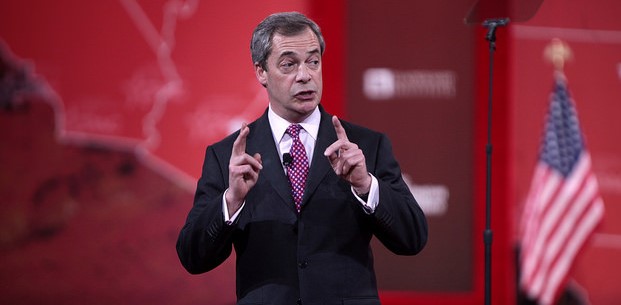Why De Gaulle Would Applaud Brexit

The Brexit vote is a classic example showcasing the rise of anti-politics. The anger and disillusionment with mainstream politics is so great that populists seem to command greater trust despite remaining divisive. History seems to have reverberated with this vote bringing the politics of two controversial and contrasting European figures, Charles De Gaulle and Enoch Powell, to life.
There are two figures from European history that would have been pleased with the outcome of the Brexit referendum: General Charles de Gaulle and Enoch Powell. De Gaulle would have been happy not only because les anglais (the English) are out. De Gaulle loved referendums because he hated political parties. These he sidelined in favour of plebiscite-driven authoritarian government. For his part, Enoch Powell generated a politicised Englishness based around anti-immigration and anti-Europeanism. He would have been pleased because the UK Independence Party’s (UKIP) victory was a triumph for Powellism beyond the grave, although he would have decried the disdain for parliament of his UKIP legatees. This was far from an uncomplicated win for democracy and the “decent people” of England and Wales.
All of this mattes to Australia. What happens next in Europe will have consequences here. The way this crisis is handled politically will be of crucial importance globally and locally. But this crisis can only be explained in part as an exercise in party mismanagement. Deeper discontents led us to this place.
Anti-politics cannot be ignored when considering the populist tidal wave and the referendum result. Dissatisfaction with mainstream politicians has become the new normal, causing pressure on the two-party system and antipathy towards politicians. Both Labour and the Conservatives in Britain have proved spectacularly poor in responding to the rise of anti-politics and the result of the referendum again demonstrated the instability anti-politics can cause.
Thus, the failure of Bremain stems in no small part from general distrust and disillusionment with mainstream politicians. The problem here is that anger and disillusionment with mainstream politics is so great that populists seemed to command greater trust despite remaining divisive. During the campaign, Nigel Farage was the only politician whose trustworthiness increased. This is perhaps unsurprising given the rise of populism and the accompanying anti-politics. UKIP is the clearest example, with 74 per cent of UKIP voters sceptical of politicians’ true intentions, well above average. Of course, the party’s Eurosceptic platform, particularly when combined with the heated topic of immigration, captured a large number of voters from across the political spectrum.
In its inter-generational aspects, Brexit is an inverse of les évenéments (the events) of 1968: it is a revolt by the old against the young. Just as Scotland, Northern Ireland and London may be dragged out of the EU against their wishes, so too will the 75 per cent of the young who voted Remain. While turnout increased with age, the youth vote was not insignificant. It is important not to ignore such a large demographic, particularly given they are likely to suffer most from Britain’s decision. The result will do little to reaffirm young voters’ slipping confidence in democracy.
In seeking recourse to a referendum there is a great irony. Eurosceptics sought to defend Westminster’s sovereignty from what they saw as an encroaching supranational EU. But to do so they undercut the sovereignty of the UK parliament from below. By invoking the People through the device of a referendum popular discontents broke the banks of party discipline.
These popular discontents were distinctly national. Scotland clearly voted to remain in the EU. The situation in Northern Ireland is more complex but Brexit is the greatest spur towards a united Ireland in one hundred years. Whether Dublin wants a large Protestant minority is another matter but it might get one anyway.
Despite Wales’ shift towards Euroscepticism, it was the Powellite revolt in England that was of most significance. The English left tends to get misty-eyed about popular revolts from Wat Tyler, to the Levellers to the Chartists; but there will be little romanticising of this one. Yet the revolt had been brewing in England for two decades. Many observers questioned the absence of English nationalism after devolution to Scotland, Wales and Northern Ireland in the late 1990s. But English nationalism was expressed via Euroscepticism. It grew along the twin tracks of Powellism: a defence of national sovereignty against the EU and a defence of local sovereignty against foreign immigrants. With London lost to England as a European and global city, it was the English shires and provinces that took Britain out of the EU.
Some might hope that the British and the Europeans will now behave as economic rationalists striking a mutually beneficial win-win deal on the single market. But this is an underestimation of the strength of European identity that animates many leaders in Europe. Just as the euro was defended when some in Australia thought that default was an option, the United Kingdom will not get a smooth ride as the Foreign Office grits its teeth and negotiates the UK out of the EU. Merkel, Hollande and Renzi—the new “Big Three” of the EU—have made this clear. Harsh treatment of the retreating UK carries the risk of inflaming Eurosceptic sentiment across the continent. Brexit could be replicated elsewhere.
Brexit is therefore not the only development within the EU that Australia needs to watch closely. If Marine Le Pen can turn next year’s presidential election into a de facto referendum on France’s membership of the EU—and win—we will be facing the prospect of a nuclear-armed state commanded by a far-right president sympathetic towards Putin’s Russia. Le Pen is Powell and De Gaulle combined.
Australia is poised delicately in this situation. Trade and historical ties with the UK are strong; they were getting stronger with the EU. The prospective trade agreement between Australia and the EU is likely delayed, if not seriously disrupted, by the referendum outcome. Australia had grown used to the UK and the EU together in a mutually beneficial trade and political relationship. Separated by Brexit, the two are less than the sum of their parts.
Dr Ben Wellings is the deputy-director of the Monash European and EU Centre at Monash University, Melbourne. Dr Annmarie Elijah is the associate director of the ANU Centre for European Studies at the Australian National University, Canberra. Dr Emma Vines is a research fellow at the Institute for Governance and Policy Analysis at the University of Canberra. This article is published under a Creative Commons Licence and may be republished with attribution.




